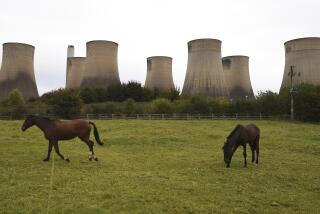Coal-generated electricity -- a burning issue
- Share via
Responding to Robert Bryce’s July 27 Op-Ed article on coal-generated electricity, “Dirty but essential,” Irvin Dawid wrote in a letter published Wednesday:
“Bryce begins his Op-Ed article on coal at Peabody Energy’s huge North Antelope Rochelle Mine near Gillette, Wyo. Is that really the best place to get an idea as to how ‘essential’ coal is to our future?
“I would point Bryce to a Georgia Power Co.plant featured in a July 14 NPR report. The plant manager explained all the reasons why his plant converted from coal to natural gas — part of a wave of conversions that accounts for the two fuels each being responsible for about one-third of the nation’s electricity production.
“Coal, historically the nation’s dominant power plant fuel, has dropped from a 60% share in 1988.
“I agree with Bryce that India and China will remain hooked on coal. But when an international climate treaty is adopted by all, I believe that coal use will subside there as it has in the U.S.”
Robert Bryce responds:
The recent blackouts in India, which affected more than 600 million people, only serve to bolster my points. Over the last decade alone, India’s coal use has doubled, and yet India’s per capita electricity consumption is just 600 kilowatt-hours per year. For comparison, the average resident of China uses about five times as much electricity.
Cheap, abundant and reliable supplies of electricity drive modernity. Americans can disparage coal all we like, but for countries such as India, which gets about two-thirds of its electricity from burning coal, there is far more interest in keeping the lights on than there is in clean energy.
Dawid objects to my visit to the world’s largest coal mine, which produces 50% more energy than all the wind turbines and solar panels in the U.S. And even if the U.S. quits burning coal altogether, domestic miners will ship their product overseas. Indeed, from 2006 to 2011, U.S. coal exports doubled.
Georgia Power’s decision to switch one of its coal-fired plants to natural gas reflects the fact that in many parts of the country, gas is now cheaper than coal. If the supply of cheap gas continues in the years ahead, it will continue displacing coal, which will help the U.S. maintain its leadership position in reducing carbon dioxide emissions. According to the International Energy Agency, America has reduced its carbon dioxide emissions more than any other country in the world since 2006.
But other countries, particularly in the developing world, simply don’t have the luxury of switching to gas. Nor do they have the option of converting to the best low-carbon option: nuclear.
As for the prospect of an international climate treaty, perhaps Dawid watched different talks than the ones that took place in Rio de Janeiro; Copenhagen; Kyoto, Japan; and elsewhere.
Given the repeated failures of those talks, there’s no reason to believe that any such treaty will be adopted.
Again, the point is obvious: We don’t have to like coal. But the fuel is here to stay.
ALSO:
More to Read
A cure for the common opinion
Get thought-provoking perspectives with our weekly newsletter.
You may occasionally receive promotional content from the Los Angeles Times.






